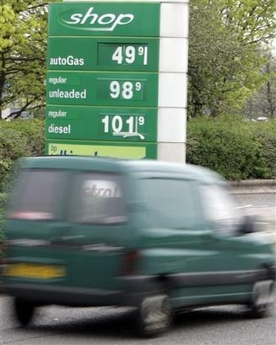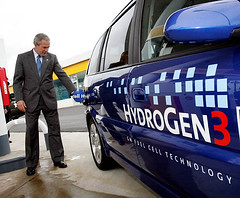Some thoughts on the energy crisis
 A van passes the price sign at a fuel station in London, Friday April, 28, 2006. A price sign at the fuel station offers a litre of unleaded petrol at 98.9 pence ( US$ 1.77 - euro 1.42) and a litre of diesel at 101.9 pence (US$ 1.84 - euro 1.46). The average prices of both unleaded petrol and diesel have reached the highest level yet in the UK.The average price of a litre of unleaded reaching 96.13p. The new price, reflecting the rising cost of oil, beat the previous record of 96.06p a litre set on September 14 last year, the AA Motoring Trust said. The average price of a litre of diesel was also at a record high, with the figure of 98.81p a litre (AP Photo/Kirsty Wigglesworth)
A van passes the price sign at a fuel station in London, Friday April, 28, 2006. A price sign at the fuel station offers a litre of unleaded petrol at 98.9 pence ( US$ 1.77 - euro 1.42) and a litre of diesel at 101.9 pence (US$ 1.84 - euro 1.46). The average prices of both unleaded petrol and diesel have reached the highest level yet in the UK.The average price of a litre of unleaded reaching 96.13p. The new price, reflecting the rising cost of oil, beat the previous record of 96.06p a litre set on September 14 last year, the AA Motoring Trust said. The average price of a litre of diesel was also at a record high, with the figure of 98.81p a litre (AP Photo/Kirsty Wigglesworth)According to an article in the Washington Post, "taxes account for about 66 percent of the pump price in Britain -- so of this month's average price per gallon of $6.40, about $4.22 goes to the government. U.S. drivers pay an average of about 46 cents per gallon in combined state, federal and local taxes, according to the Tax Foundation in Washington."
Niall Ferguson, the British historian now teaching at Harvard, comments about the wringing of hands in the U.S. over energy prices, in his column, "Nonsense, nonsense, nonsense: the myths about high oil prices" in the Daily Telegraph. From the column:
So who's to blame for higher oil prices? This week, we have heard nearly all the usual suspects fingered, along with some new ones. "We are dealing not just with normal supply and demand economics," Lord Browne, the chief executive of BP explained in an interview. "Financial activity in the oil markets" was driving prices up, one of his colleagues explained, a thinly-veiled reference to hedge funds.
American politicians offered a less subtle story. Leading Democrats blamed President Bush for being too "cosy with the oil industry". Those who previously argued that the Bush administration invaded Iraq to make oil cheap now argue that it was in fact, er, to make oil dear.
The Chancellor? The hedge funds? The oil companies? I'm surprised someone hasn't yet blamed the Deputy Prime Minister, John Prescott, who famously keeps two Jaguars - one (it now turns out) for each of the women in his life.
This blame game is a farce. The price of fuel is high precisely because of "supply and demand economics", as Lord Browne knows only too well. Global demand for oil has risen by around 40 per cent in the past 20 years. As so often in world economic affairs these days, a crucial role is being played by China. In the last five years, the G7 countries have accounted for just 15 per cent of the growth in global demand; China has accounted for twice that.
Soaring demand is coinciding with stagnant supply. Global refining capacity has scarcely grown and took a big knock from last year's hurricanes. Meanwhile, political instability in some of the world's principal oil producing countries - Iraq, Nigeria and Venezuela - has made commodity traders and intelligent investors legitimately pessimistic about future supply. And let's not forget the possibility of US air strikes against Iran. It's hardly "speculation" to bid up the price of oil futures. Only a fool is "short oil" these days.
Again, to take a point made by the late Jane Jacobs and extend the idea, "the question isn't the high cost of oil as much as it the high demand for oil? What are we using this oil for and does that use make sense, is it an efficient use of resources?"
In the U.S., 65% of oil consumption is used for driving. Some of this is for transportation of goods and services, but the bulk is general driving. I happened to be out in sprawlville yesterday in suburban Maryland (but without my camera!) and in the subdivisions everyone gets around to everything by car. And most of the men talk about their cars... (is that a Hemi 300? Fat. And they get into extended conversations about how they upgraded their cars).
Compact development allowing mobility without car dependence is a way out of the high demand problem that the "energy crisis" is really about.
Meanwhile, U.S. legislators have proposed suspending federal taxes on gasoline for 2 months, to help depress the "high cost of gasoline." Driving is already subsidized to the tune of 50%. Should it really be subsidized even more? And does it make sense to cease collecting excise taxes, which are used to pay for roads?
As the Seattle Times says today in the editorial, "Idling away the gas-price crisis:"
Fast-rising gas prices are prompting President Bush and Congress to fall over one another with shortsighted ideas for dealing with the crisis. The Democrats' earlier idea to offer $500 rebates to taxpayers to compensate for soaring prices is dumber (only by $400) than the Republicans' idea for $100 rebates for the same purpose.
But even the Seattle Times only gets it half right:
The gas crisis is real. Lawmakers have to practice what they preach and craft long-term proposals that make a real difference. Start with a serious look at alternative fuels and higher mileage standards.
Alternative fuels and higher mileage standards are focused on maintaining the current development paradigm of deconcentrated sprawling, single-use, automobile-connected land use. Maybe if everyone drove motorcycles, such a paradigm could manage to be maintained in a high-cost gasoline scenario. Otherwise, that is where attention needs to be spent.
Such are merely about what I call the "Next Generation Asphalt Nation."
 Pablo Martinez Monsivais / Associated Press. President Bush removes the fuel cap off a Hydrogen powered compact vehicle during his visit to a Hydrogen Fueling Shell Service Station, in Washington. (May 25, 2005).
Pablo Martinez Monsivais / Associated Press. President Bush removes the fuel cap off a Hydrogen powered compact vehicle during his visit to a Hydrogen Fueling Shell Service Station, in Washington. (May 25, 2005).Index Keywords: energy



0 Comments:
Post a Comment
<< Home